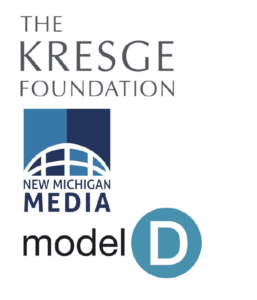DETROIT – The Islamic Center of Detroit opened Muhammad Ali Park last spring as one of its many initiatives to bring together District Seven.
Islamic Center of Detroit Community Relations Director Muthanna Al-Hanooti said the area, formerly known as Belton-Mark Twain Park, transformed into a beautiful space.
“We converted the area from a dumping area for garbage to something good,” Hanooti said. “It’s a beautiful area. It’s a park.”
Hanooti said children and community members are benefiting from the park, especially in the summer.
“Our community lacked this safe space for our youth to play sports and a quality outdoor space for families and community members to gather and live active, healthy lifestyles,” an ICD press release reads. “The vision was to create stronger bonds with sports tournaments, interfaith picnics and community events.”
The space is named after Muslim and African American boxer and activist Muhammad Ali.
“It fits the city and us as a community,” Hanooti said. “We are an African American city, and he (Ali) was a great civil rights and Muslim leader. For us he is a big hero.”
Sufian Nebhan, executive director of the Islamic Center of Detroit, said the park and its name fits with the Center’s goal to serve the Detroit community.
“What could be a better name than a Detroiter from the neighborhood to represent Muslims and bring a gift (park) back to the city,” Nebhan said.
The Center pitched the park idea to Mayor Mike Duggan and received an $80,000 grant from the county, $150,000 grant from the Embassy of Qatar and the rest of the $355,000 total in funding from community members.
Nebhan said this project expanded the ICD’s relationship with Qatar.
“The relationship built from creating this park between Qatar, the city of Detroit and the Muslim community is a huge new opportunity to expand exposure and reach new outside investors to invest in big cities with Muslim populations to improve the lives of not only Muslims but everyone in the city,” Nebhan said.
Americans gave $319.04 billion to charity; more than 40 percent of those funds went towards religion, Indiana University reported on Giving USA’s findings. Muslims make up 1.1 percent of the population, but contribute 1.4 percent — $4.3 billion — of all contributions towards noteworthy causes and campaigns in 2021, IU’s “Muslim American Giving 2021” report found.
Muhammad Ali Park is only a fraction of what the Center has accomplished for District Seven since opening 24 years ago. Its first project created the largest Muslim youth center in the state of Michigan.
The Center continues to expand services and now offers mental health and wellness, food security, youth leadership, fitness, immigration and refugee programs.
“This is our community,” Hanooti said. “We don’t look at the community as being Black, White, Arab, Muslim, non-Arab, non-Muslim. It’s one community. This is a part of our contribution. The whole (goal) is to contribute to the community.”
The Center is currently working on a $13 million dollar project that will transform an old school into a health clinic that hopes to provide free primary care, dental and mental health services for uninsured and underinsured folks in metropolitan Detroit.
Hanooti said one of the most important services the ICD offers is mental health support, adding that the Arab and Muslim community in the Dearborn area loses about one person a month to substance abuse or suicide.
“We are like any other average American. We are not different,” he said. “The only difference I would say is the stigma. They are shy to say it. (They think) we are Muslims, we do not have this, it’s not in our culture, but we have it… You don’t have to be bashful telling us about your kid or yourself or your wife having an issue.”
The program focuses on education and substance abuse prevention, and partners with the Detroit Wayne Integrated Health Network for treatment.
“All the work we do we work with partners. You can’t work alone,” Hanooti said. “There are more advanced people than you. You help them, they help you.”
He said the ICD is able to provide services because of their work with grants.
“We are the first Muslim group in Michigan who is tackling grants because other organizations only deal with community with traditional fundraising,” he said. “We are the only ones who use this resource. Part of our vision is to encourage the Arab Muslim community to tackle other resources.”
Hanooti also said District Seven has grown since its inception.
“Part of our job by default, we invite other Arab American or Muslim American to move to live here and also to move their businesses,” he said. “So the area develops even in terms of security. And so you’ve seen that all real estate is going up.”
He said the Islamic Center of Detroit aims to continue to improve the lives of people around them.
“That’s the the duty of any any charity,” he said. “You have to make people’s lives better.”
– Resilient Neighborhoods is a reporting and engagement series that examines how Detroit residents and community development organizations are working together to strengthen local neighborhoods. This story was originally produced and published by Model D Media and is reprinted in New Michigan Media newspapers through a partnership supported by the Kresge Foundation.















Leave a Reply